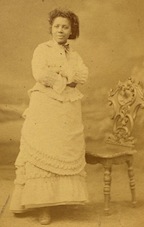 Mary Edmonia Lewis was the first African American sculptor to receive international fame. Born in upstate New York in 1844 to a Haitian American father and a mother of Chippewa descent, Lewis lived her first 12 years as a Native American. After her brother had been successful in mining in the West, he arranged for her to go to school. She eventually made her way to Oberlin College in Ohio but was charged both with stealing art supplies and trying to poison two White students. While she was acquitted of the charges, she did not graduate and instead went to Boston to study under sculptor Edward Brackett.
Mary Edmonia Lewis was the first African American sculptor to receive international fame. Born in upstate New York in 1844 to a Haitian American father and a mother of Chippewa descent, Lewis lived her first 12 years as a Native American. After her brother had been successful in mining in the West, he arranged for her to go to school. She eventually made her way to Oberlin College in Ohio but was charged both with stealing art supplies and trying to poison two White students. While she was acquitted of the charges, she did not graduate and instead went to Boston to study under sculptor Edward Brackett.
In 1868 she move to Rome where she spent most of the remainder of her life, at time traveling back to the United States to showcase her work. Recently, researchers at the Walters Art Museum in Baltimore found a photograph of Lewis in an antique shop. The photo appeared on a carte-de-visite, or calling card, that artists would leave in a manner in which business cards are used today. Prior to this discovery, there were only seven known photographs of Lewis, all from the same sitting by a photographer in Chicago.









One love and Sak Pase? OMJah! Thanks a gazillion for posting this JBHE. I have her! I am dying to be a sculptor and here she is my role model. I will do her biography. Thank you thank you mesi anpil. Blessed love.
More facts and links about Edmonia Lewis are at http://edmonialewis.com — including the earliest image of her, an engraving published in 1868 used as cover art on her new biography.
One love. Thanks. I checked them out last night. Great read. I feel that too, little is made about her Haitian ancestry. Its been minimalized and rendered insignificant. In fact, most just seek to write about her and memorialize her as an African American. Blessings.
Thanks for kind words. Our biography goes into Edmonia Lewis’s connection with Haiti through her brother who was born there and hid the fact most of his life. Their father we believe came from Newark NJ and had at least one relative there named Hannah Lewis.
Lewis’s heritage was complex, being born in 1844 near Albany to a Chippewa woman and raised, we believe, among the Mohawk Indians served by Jesuits on the New York / Quebec border.
We hope you read further.
Hi. Thanks. I will keep reading further about her. I am beyond intrigued. And like belle hooks, I feel greatly inspired by her and I am soo happy that she was part Haitjan. Thanks again.
@ Marie Nadine Pierre, if your re-read Albert Henderson’s remark, he does not state that she was Haitian, nor does he state she was “part Haitian”. He states that her brother (Samuel) is believed to have been born there, while she was born in the US and enslaved in the US to a native Black and Ojibwe mother, and a father for whom they have no evidence to support the idea that he was Haitian. Her father’s family, as Henderson states, was also based in the US, in NJ.
Again, reading is helpful.